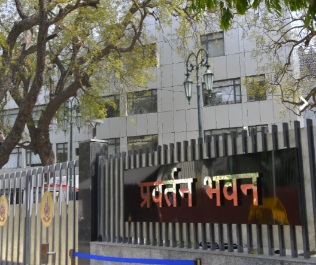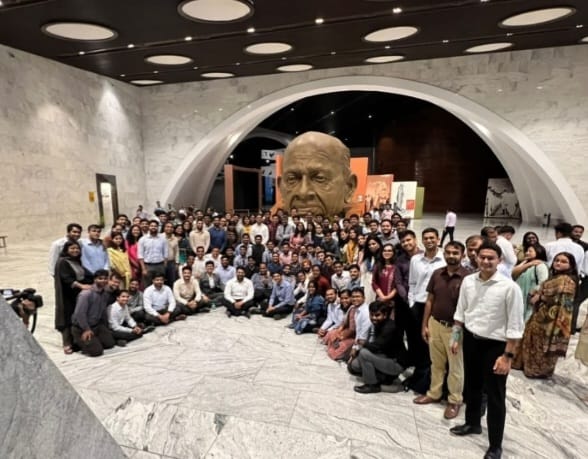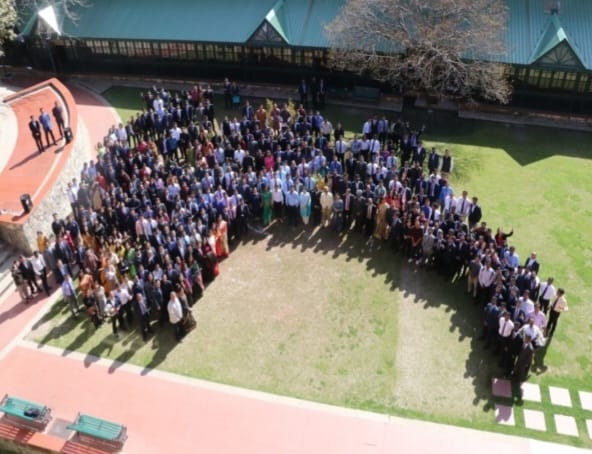New Delhi/Shimla: India’s premier bureaucratic service, often seen as the backbone of governance, is fast losing its sheen, plagued by rampant corruption.
The recent expose involving Sanjeev Hans, an IAS officer of the 1997 Bihar cadre, is yet another blow to the credibility of the service.
The Enforcement Directorate (ED), Patna, has provisionally attached assets worth ₹23.72 crore under the Prevention of Money Laundering Act (PMLA), 2002.
These include three land parcels in Nagpur, a luxury flat in Delhi, and three swanky apartments in Jaipur, all linked to Hans and his associates—Praveen Chaudhary, Pushpraj Bajaj, and their families, revealed ED.
These properties, suspected to have been purchased using ill-gotten wealth, are just the tip of the iceberg.
The rot runs deep, with countless examples of IAS officers abandoning their constitutional oaths and the rigorous training imparted by the Lal Bahadur Shastri National Academy of Administration.
Instead of serving the nation, many seem to have a singular agenda: amass wealth through dubious means. This has brought bad name to the institution and putting a big question mark on the "values they cherish" when they take up their jobs.
Corruption in Bureaucracy: A Growing Epidemic
Sanjeev Hans is not alone. Across India, officers with questionable integrity continue to mock the system.
Take the case of Ashok Kumar Singh (name changed), who was caught hoarding over ₹10 crore in cash during a raid. ED had seized cash from the houses of certain IAS officers in Jharkhand and Chattisgarh in recent years.
Or the infamous couple in Madhya Pradesh—Arvind and Tinu Joshi—who were found with ₹360 crore in disproportionate assets in 2010. The list is long, and the stakes are high.
Every year, the Union Public Service Commission (UPSC) claims they select "some of the brightest minds" in the country.
But instead of becoming agents of change, many bureaucrats turn into agents of greed.
From land scams to siphoning public funds, the bureaucracy is no longer the steel frame of governance envisioned by Sardar Vallabhbhai Patel.
Every year, the new batch take a photos at LBSNAA with statue of Sardar Patel in the middle. But what unfolds when they are at the driving seat of the government?
Connivance with Lawmakers: A Nexus of Corruption
The critics ague that even more alarming is the collusion between bureaucrats and lawmakers.
Politicians, including MPs and MLAs, often shield corrupt officers in exchange for kickbacks or political favors.
These officers, in turn, are rewarded with plum postings as advisors or heads of key state departments, further perpetuating the cycle of corruption.
In many states, individuals with tainted records hold influential positions.
For instance, in Maharashtra and Uttar Pradesh, bureaucrats under investigation for serious charges have been made advisors to chief ministers.
Some officers in Himachal also face the same scrutiny and have become the talk of the town. Some of them hold key posts in the government even after retirement.
This blatant disregard for integrity has shaken public faith in governance.
Who Is Accountable? The Need for Systemic Overhaul
The question that looms large is: who is selecting these officers? The UPSC, once revered for its rigorous examination process, seems to be falling short when it comes to filtering out individuals with dubious ethics.
Is it time to overhaul the selection process to include more stringent character assessments?
Moreover, why is there no accountability for those who betray public trust?
The service, designed to uphold democratic values, is now seen as a money-minting enterprise.
Time to Expose and Shame
People of India deserves better as we head towards celebration of 100 years of our independence.
Bureaucrats who defy their constitutional duty should not only face legal consequences but also public shaming. Transparency in governance and proactive whistleblowing mechanisms must be prioritized.
While the Sanjeev Hans case has made headlines. But none of the Parties so far have talked about reforms in UPSC and training at LBSNAA.
Infosys co-founder N.R. Narayana Murthy has suggested that India should consider recruiting Indian Administrative Service (IAS) and Indian Police Service (IPS) officers from business schools, rather than relying solely on the Union Public Service Commission (UPSC) examinations.

He believes this shift would transition the bureaucracy from an "administrative mindset" to a "management mindset," fostering innovation, vision, and efficient execution in governance.
Murthy stated, "The administration is all about the status quo. On the other hand, management is all about vision and high aspiration. It’s about achieving the plausible impossible."
He has made a solid point. Murthy also mentioned that the current system of hiring is part of the administrative approach which has roots in 1858 when the East India Company transferred the dominion to the British crown.
He said the objective of the civil servants then was to go slow and delay implementation because the native population was to be kept under control.
Murthy's proposal has sparked debate, with some former IAS officers defending the existing UPSC system as inclusive and merit-based, emphasizing its role in balancing governance with democratic policy-making.
But Murthy being a businessman has meant business only and his call can not be termed as a cure-all for the rusting steel frame
The nation needs to demand hard answers and reforms. The steel frame is rusting, and it’s high time we expose and eradicate the rot. Will the Modi Government take a call?
Readers Comments:
1.Root out this systemic disease, I bet, India can be a Golden sparrow again. Change must begin at political level because bureaucracy on it's own has limits.
Recently, one of our parliamentarians as a member of parliamentary committee, refused to accept a gift from Indian Railways saying that this is unethical and may amount to accepting a bribe. We have such leaders also, who have very high standards on probity and integrity.
I also remember my childhood days when election campaign used to be done in very simple and ordinary way without having any need to spend money.
Focus of the candidates was to traverse as much of the constituency as possible on foot and meet as many people as possible individually.
Even high profile leaders used to spend nights in villages among villagers. That simplicity in electioneering contributed in a huge way for honest practices in governance because there was hardly any nexus between leaders and cronies- Manoj Kumar, Technocrat and Hydropower Expert.
2. The very good article- DK Manta, Member, Ombudsman, MNREGA, Himachal Pradesh.









